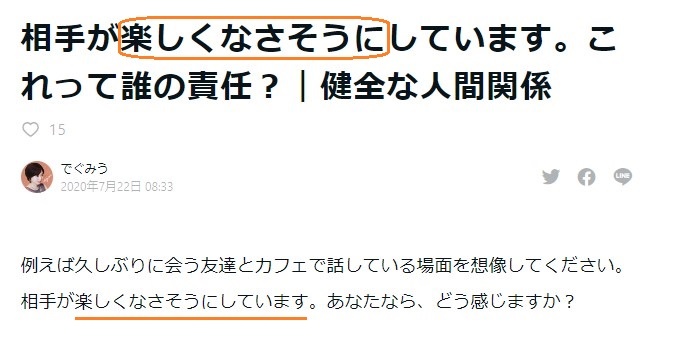なさそう (nasa sō) Meaning Japanese Grammar - Does Not Look
Anna Baffa Volpe
Get in touch with meThe structure なさそう (nasa sō) means does not look, does not seem like or seem unlikely to.
It is used with the plain negative form, so I think it is also an opportunity to review the ない form.
How なさそう is formed
We can use this structure with nouns, adjectives and verbs.
In the case of the verbs various forms are used combined with なさそう.
How and when なさそう is used
なさそう is the negative form of そう and they refer to something that looks or doesn't look in a certain way, which we intuitively feel after seeing or hearing about it.
なさそう with Adjectives
In the case of the Adjectives ending in い, let's remember to remove the vowel い at the end of the word.
このラーメン、そんなに辛くなさそう。
This ramen does not look so spicy.
このお菓子は美味しくなさそうだ。
This sweet doesn’t look tasty.
The adjective 良 becomes 良く+なさそう
あまり調子がよくなさそうだよ。
You don't look very well.
The Adjectives in な function like nouns, so the term is used without the kana な.
あの方は親切じゃなさそうだね。
That person doesn't seem very kind, does he?
なさそう with Nouns
彼は悪い人じゃなさそうだ。
He doesn't seem like a bad person.
自家製じゃなさそうだ。
That doesn't seem to be homemade.
自家製 is translated as adjective homemade; in Japanese, it has the function of noun.
なさそう with Verbs
We use the structure with the plain negative form but it is very common the form expressing desire by the suffix たい in the negative たくない.
He doesn't seem he will go
Let's consider now the form with the suffix たくない: don't / doesn't want to
- 行きたくない don't / doesn't want to go
From a post about Cat Behaviors:

行きたくなさそうな姿が可愛い!
It's cute the image of the cat that doesn't seem he wants to go.
Other examples:
あのチームは今年も優勝しなさそうだ。
It seems like that team is not going to win this year again.
彼は勉強しなさそうだ。
He doesn’t seem like he would study.
彼らは心配しなさそうだ。
It seems like they are not worried.
彼女はパーティに来なさそうだ。
She doesn't seem to come to party.
The verb ある that means there is / are, has its negative form as ない there isn't / aren/t and becomes なさそう.
急ぐ必要はなさそうだ。
There seems to be no need to hurry.
なさそう in the past
The past tense is expressed by the past form of the copula だ / です which becomes だった / でした.
彼女は興味がなさそうだった。
She did not seem interested.
なさそうな and なさそうに
なさそう can be followed:
- by the kana な which turns the expression into an adjective followed by a noun or
- by the particle に to obtain the adverb followed by a verb
彼女は関心がなさそうな様子だった。
She did not seem interested.
様子 yōsu is the noun meaning situation, state, behaviour Letterally: It was a behaviour through which she didn't seem to show interest. 人の特徴: Characteristics of people

悩みがなさそうな人の特徴–なぜ、そう思われる?原因は?
Characteristics of people who seem to have no worries – Why do they think that? What are the causes?
効用のなさそうなものを除外していきます。
We will exclude those things that do not seem to be useful.
物 mono indicates a thing, an object, an article or a property depending on the context. 人間関係 Human Relationships

相手が楽しくなさそうにしています。これって誰の責任?健全な人間関係
The other person doesn't look like to enjoy. Who is responsible for this? Healthy Relationships
A hypothetical situation:
例えば久しぶりに会う友達とカフェで話している場面を想像してください。相手が楽しくなさそうにしています。あなたなら、どう感じますか?
Imagine, for example, a situation where you are talking in a café with a friend you haven't seen in a while. It looks like the other person isn't having fun. How would you feel?
- Other sentences with the function of adverbs:
彼はやる気がなさそうに見える。
He seems unmotivated.
彼らは全く興味がなさそうに聞こえる。
They sound completely uninterested.
Similar grammar points in Japanese 📚
申し訳ございません
申し訳ございません (moshi wake gozaimasen) Meaning Japanese Grammar - I Apologize
わけがある
わけがある (wake ga aru) Meaning Japanese Grammar - There Is a Reason If
わけがない
わけがない (wake ga nai) Meaning Japanese Grammar - There Is No Reason That
わけではない
わけではない (wake dewa nai) Meaning Japanese Grammar - Does Not Mean That
わけだ
わけだ (wake da) Meaning Japanese Grammar - That's Why...
わけが分からない
わけが分からない (wake ga wakaranai) Meaning Japanese Grammar - Absurd